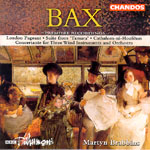This latest disc in Chandos’ continuing survey of the works of Arnold Bax contains world premiere recordings. It opens with the London Pageant, which Bax composed for the 1937 British Coronation. The piece, ostensibly a march but with the dimensions and diversity of a symphonic poem, rings with brightly glittering flourishes suitable for the occasion, and contains more than a hint of Elgar’s celebratory style. Next comes the 1949 Concertante for Three Winds and Orchestra, a beautifully melodic work in the style of Bax’s later symphonies that features a different instrumental soloist–English horn, clarinet, and French horn–in each of the three movements, with all coming together for the brief finale. This novel approach makes for a satisfyingly varied and interesting work. Gillian Callow, John Bradbury, and Jonathan Goodall each shine in their respective turns.
After being mesmerized by the visiting Ballet Russes on its 1911 London visit, Bax embarked on the composition of his own “Russian ballet” based on the legend of Tamara. The two-hours-plus piano score remained unperformed until 2000, when Graham Parlett orchestrated five movements into a suite comprising the essential action from the scenario. The music brims with Russian influences, most notably Rimsky-Korsakov, and Parlett’s arrangements make for a highly enjoyable pastiche. Finally, the symphonic poem Cathaleen-ní-Hollihan was originally the slow movement from Bax’s E major String Quartet, composed in 1903 while still a student. The title refers to a Yeats poem that was the original inspiration, and in this early piece you can hear the langorous style, and the use of native Irish music, that were to become defining features of Bax’s later work. Martyn Brabbins proves himself to be a sympathetic and persuasive interpreter of Bax’s music in these warm and evocative performances, played with delight and polish by the excellent BBC Philharmonic. Chandos’ big “house sound” creates the ideal atmosphere. Bax lovers need not hesitate. [5/20/2001]
































